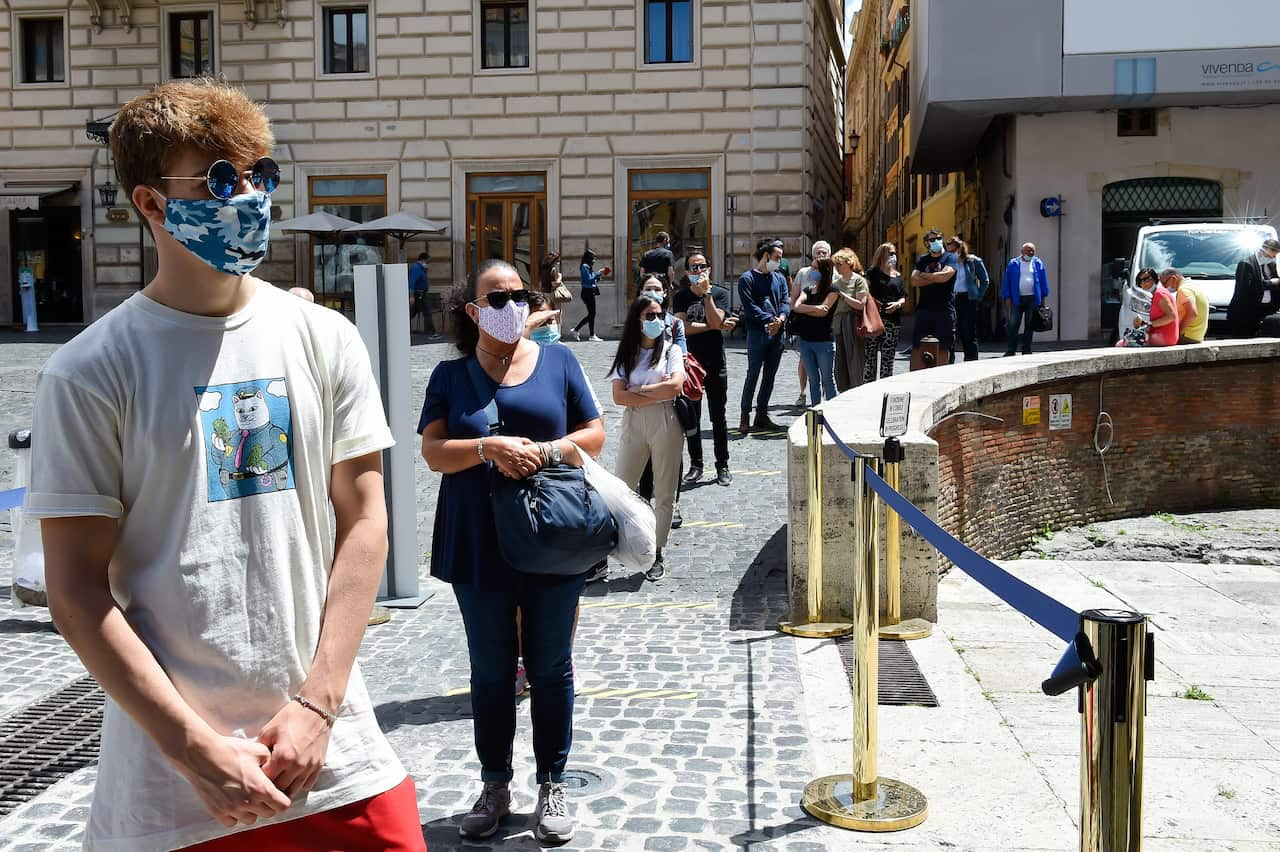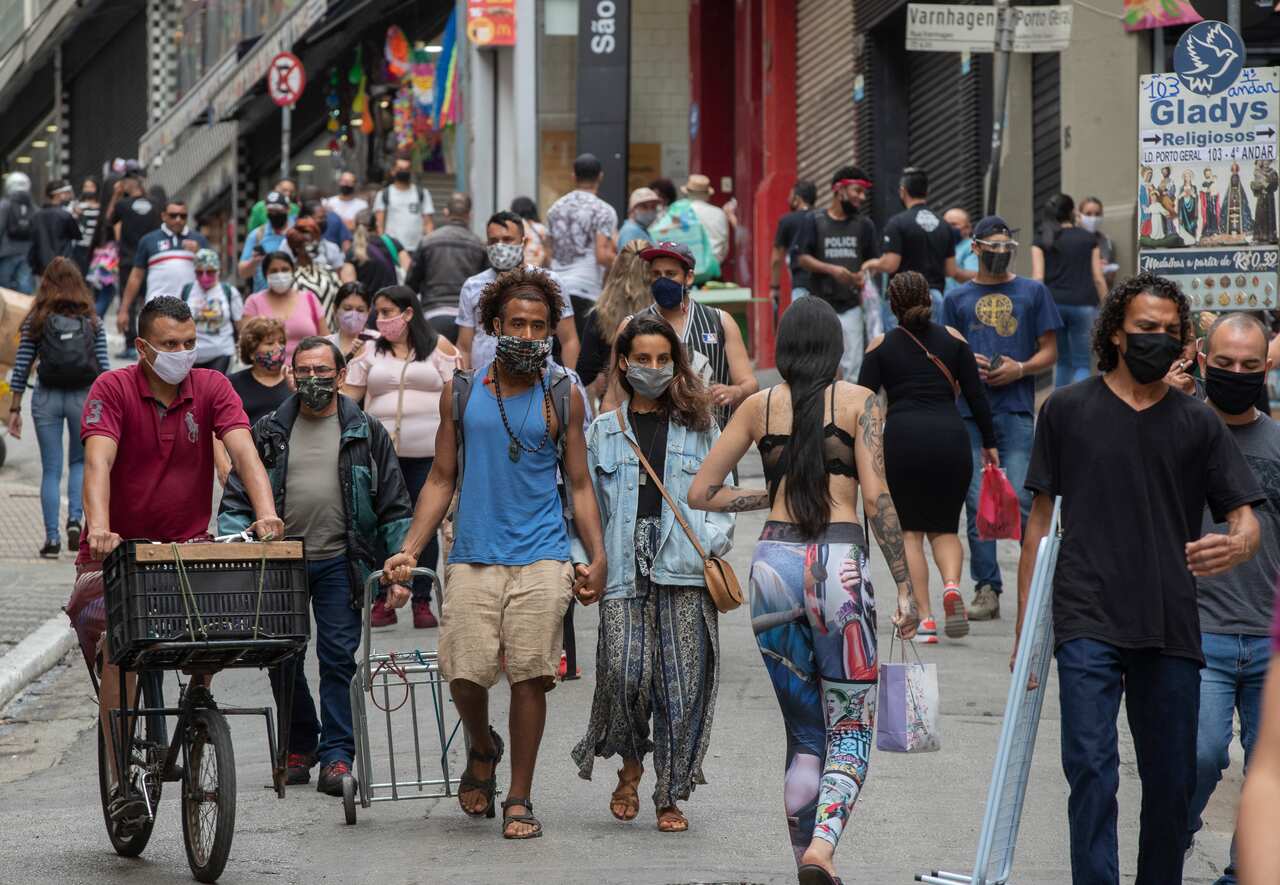The European Union says it hopes to reopen its external borders to foreigners in July, as leaders look to loosen the economic stranglehold of virus lockdowns that are triggering a steep global downturn.
Europe has suffered devastating human losses from the pandemic, accounting for just under half of the 411,000 lives claimed by COVID-19's deadly tear across the world. Now the continent is trying to contain the fallout of a historic recession spurred by restrictions on movement and business that have saved lives but have choked global commerce.
Now the continent is trying to contain the fallout of a historic recession spurred by restrictions on movement and business that have saved lives but have choked global commerce.

Tourists wait to get into Rome's Pantheon, which reopened this week after the coronavirus lockdown. Source: AAP
The world economy is on course to contract by at least six percent this year due to virus shutdowns, according to a grim outlook from the Organisation for Economic Co-operation and Development (OECD).
By the end of next year, the loss of income should surpass that of "any previous recession over the last 100 years outside wartime", the forecast warned.
'Gradual and partial' reopening
EU member states have the final say on border measures. But Brussels is suggesting a "gradual and partial" reopening of external frontiers to travellers outside the bloc from 1 July, diplomatic chief Josep Borrell said Wednesday.
Greece, whose economy depends heavily on tourism, has already announced it will reopen its skies from 15 June to a list of countries including non-EU states such as Australia, China and South Korea.
Australians will not be allowed to take up that offer, however, with a strict ban on leaving the country still in place.
Austria will allow free travel from most European nations in mid-June, but with exceptions for Spain, the UK and several other countries, for which testing or quarantines will be required.
Germans will be free to travel to EU member states on Monday, though the country has decided to extend its warning against travel outside the EU until 31 August.
'Astonishing' efforts
In Spain, where more than 27,000 people have died from COVID-19, La Liga soccer championships are set to resume on Thursday for the first time in three months.
Meanwhile in Britain, which has the highest death toll in Europe, Prime Minister Boris Johnson defended what he described as the country's "astonishing" efforts to tackle the virus.
But one top scientist there said the number of fatalities could have been halved had lockdown measures been introduced a week sooner.
In Italy, prosecutors said they wanted to question Prime Minister Giuseppe Conte and the health and interior ministers over how the government handled the pandemic.
Second wave fears
As barriers to movement start to lift, the virus is still gaining ground in countries around world, particularly in Latin America, which has logged more than 1.4 million cases and nearly 70,000 deaths.
The WHO's regional arm, the Pan American Health Organization, has warned that upcoming hurricane season could further hamper the fight against the virus. Worst-hit Brazil is leading the continent with the world's third highest death toll - 38,406 - after the US and Britain.
Worst-hit Brazil is leading the continent with the world's third highest death toll - 38,406 - after the US and Britain.

People walk through a downtown shopping district in Sao Paulo, Brazil. Source: AP
Peru is also battling a steep surge, with more than 200,000 infections.
In Nicaragua, which has not taken robust steps to contain its outbreak, at least eight public health doctors were sacked for criticising the lack of a serious response by President Daniel Ortega's government, an independent medical body said.
Elsewhere around the globe, clusters of infection were growing as governments relaxed restrictions. Earlier this week, the WHO warned against complacency.
Iran announced more than 2,000 new cases on Wednesday, part of a recent surge the government attributes to increased testing.
Indonesia also posted a record number of 1,241 new coronavirus cases, sparking calls from health experts for the world's fourth most populous country to slow down the easing of its lockdown measures.
In India's capital New Delhi, authorities say they expect half a million COVID-19 cases that will need 150,000 hospital beds by mid-July.
But in China, where the virus first emerged late last year, wildlife activists celebrated a victory after authorities decided to remove pangolin parts from its official list of traditional medicines.
Some scientists suspect that the endangered and heavily-trafficked animal, which lives in Africa and Asia, may have been the host of the novel coronavirus that emerged at a market in China's Wuhan city last year.
People in Australia must stay at least 1.5 metres away from others. Check your state’s restrictions on gathering limits. Testing for coronavirus is now widely available across Australia. If you are experiencing cold or flu symptoms, arrange a test by calling your doctor or contact the Coronavirus Health Information Hotline on 1800 020 080.
The federal government's coronavirus tracing app COVIDSafe is available for download from your phone's app store. SBS is committed to informing Australia’s diverse communities about the latest COVID-19 developments. News and information is available in 63 languages at sbs.com.au/coronavirus
Share



